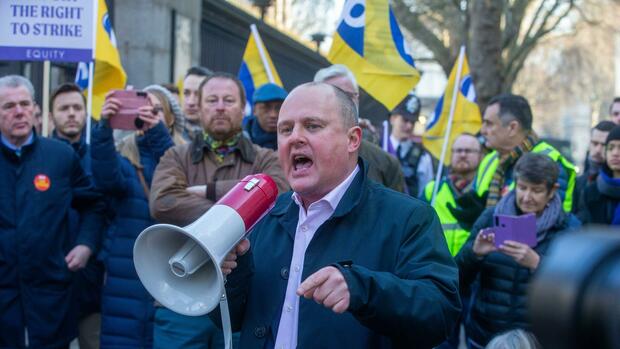Specifically, it is about the new anti-strike laws, which have been in force since the summer and require employees to ensure a minimum supply in key sectors even during strikes. The TUC trade union association sees this as an inadmissible restriction on the right to strike.
Prime Minister Rishi Sunak’s government insists that the stricter rules are necessary to protect the population. The background to the dispute is the mass strikes by railway workers, nurses, doctors and teachers in Great Britain that have been going on for more than a year and have repeatedly brought many public services to a standstill.
According to calculations by the Resolution Foundation think tank, the British economy has lost around four million working days due to industrial disputes in the past twelve months. Public sector employees are demanding compensation for the high inflation, which until recently was almost ten percent, but has now fallen to 6.8 percent. The government considers this to be unaffordable given tight budgets.
“The ILO has already slapped the British government in the face and called on it to ensure that existing and future laws are in line with ILO standards,” said TUC boss Paul Nowak at his organization’s trade union conference in Liverpool. “These laws are not intended to resolve workplace conflicts, but rather to escalate them. They are unworkable, undemocratic and certainly violate international law.”
The government sees it completely differently: “The purpose of this legislation is to protect the lives and livelihoods of the general public and to ensure that they continue to have access to vital public services during a strike,” said a government spokesman, justifying the new laws.
Unions are threatened with claims for damages
For paramedics, firefighters and railway workers, the rules should also be enforced despite resistance from employees. Anyone who violates this must expect labor law sanctions up to and including dismissal. The unions involved are threatened with lawsuits for damages. For other services such as education and health care, the government hopes to reach voluntary agreements with workers.
However, it doesn’t look like that at the moment. The TUC wanted its members to vote on Monday, at the request of the RMT transport workers’ union, on a campaign calling on unionists to oppose the new rules.
“If the first worker is fired because he refuses to work on a strike day, we will fight in the factories and on the picket lines,” said TUC leader Nowak on Monday.
>> Read also: Will there be an upswing after Brexit?
Most recently, railway workers shut down rail traffic in many parts of Great Britain on September 2nd in order to enforce higher wages. They are now threatening to make it more difficult to travel to the Tories’ party conference at the beginning of October with strikes.
Labor party moves further into the political center
Before its annual meeting, the TUC had already intensified the conflict with the government and discussed a wealth tax for the 140,000 richest Britons. However, the trade union federation cannot expect support for the controversial proposal from the Labor Party, which is traditionally closely linked to the trade unions. Rachel Reeves, who is set to become finance minister if the Labor Party, which is well ahead in the polls, wins the election, has so far rejected such plans.
The relationship between the unions and Labor has cooled noticeably. Sharon Graham, general secretary of Britain’s second largest union Unite, warned Labor leader Keir Starmer in the summer not to view support for workers’ organizations as a “blank cheque”.
The party recently collected more donations from entrepreneurs than from unions.
(Photo: AP)
Starmer previously drew the ire of many unionists when he told Labor MPs not to picket the mass strikes. The opposition leader wants to free his party from the socialist image that his predecessor Jeremy Corbin gave the Labor Party.
Starmer, on the other hand, would like to move Labor more towards the political center, following the example of former British Prime Minister Tony Blair, in order to improve his chances in the general elections expected to take place next year. The Labor leader met union leaders on Monday evening.
Supermarket owner Sainsbury donates to Labor
Labor is also no longer as financially dependent on union donations as it used to be. According to the Electoral Commission, the party achieved record revenues of 10.4 million pounds (around 12 million euros) in the second quarter of 2023.
The two largest individual donations came from entrepreneurs David Sainsbury (three million pounds) and Gary Lubner (2.2 million pounds). The owner of the supermarket chain Sainsbury’s stopped making donations during the Corbyn era. Labor received a total of £2.7m from unions in the three months to June.
More: British government makes peace offer to unions
